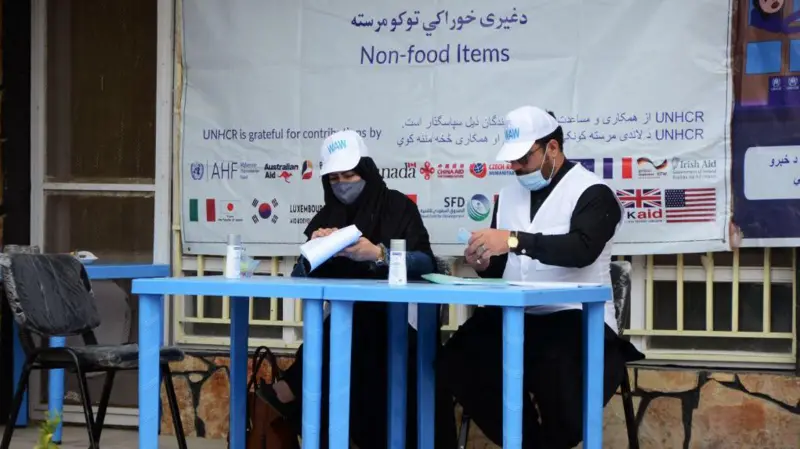RASC News Agency: Afghanistan now teeters on the brink of an unprecedented humanitarian catastrophe, as the Taliban’s repressive decrees against women and civil society have gutted the country’s already fragile aid infrastructure. The regime’s sweeping ban on women’s employment within international and non-governmental organizations has crippled the nation’s capacity to respond to poverty, displacement, and natural disasters creating a human tragedy of historic proportions.
Social analysts and humanitarian experts describe this policy not merely as an act of discrimination, but as a strategic dismantling of modern Afghanistani society. By erasing women from the workforce and public life, the Taliban have engineered an environment of enforced dependency, deepening destitution and silencing half the population under the guise of moral governance.
“This is not religious devotion it is social suffocation disguised as piety,” said one Afghanistani sociologist now living in exile. “The Taliban have weaponized faith to institutionalize fear.”
The most recent manifestation of this gender apartheid unfolded at the Islam Qala border crossing in western Afghanistan, one of the country’s most vital humanitarian gateways. The Taliban’s latest edict prohibits female staff from working with international aid organizations stationed there a move that has forced the United Nations and numerous relief agencies to suspend all operations at the site.
Indrika Ratwatte, the UN’s Humanitarian Coordinator for Afghanistan, told Agence France-Presse that Taliban authorities have imposed “immediate and unworkable restrictions” on Afghanistani women aid workers. The result, she warned, has been the paralysis of humanitarian operations and a direct assault on “the safety, dignity, and survival of returning women and girls.”
The implications are grave. Islam Qala serves as the main entry point for deported Afghanistani refugees returning from Iran the majority of whom are women and children. Without female staff to conduct medical assessments, distribute aid, or provide protection services, humanitarian organizations can no longer uphold even the most basic standards of care or confidentiality.
“We cannot deliver assistance in a manner that respects human dignity without female staff,” Ratwatte said. “Their exclusion is an assault not only on women’s rights but on the principles of humanitarian work itself.”
Since December 2022, when the Taliban first banned women from working in domestic and international NGOs and later expanded the order to include UN agencies in 2023 the country’s humanitarian ecosystem has been systematically dismantled. Hundreds of aid programs in education, healthcare, nutrition, agriculture, and reconstruction have been suspended or terminated.
The United Nations Office for the Coordination of Humanitarian Affairs (OCHA) reports that more than 28 million Afghanistani citizens nearly two-thirds of the population are now in need of urgent aid, while humanitarian access has shrunk to its lowest level in two decades.
According to official UN data, over 1.2 million Afghanistani migrants have been forcibly expelled from Iran this year alone. Most enter through Islam Qala, where Taliban-imposed restrictions have eliminated essential support structures, leaving thousands of families stranded in open desert camps without food, shelter, or medical care.
“The Taliban’s decrees have transformed humanitarian work into a hostage of ideology,” said a Western diplomat in Kabul. “Every act of cruelty is wrapped in scripture; every policy of exclusion is justified in the name of faith.”
Experts argue that these restrictions are not the product of religious conservatism but of political calculus a deliberate effort by the Taliban to consolidate control by suppressing women, silencing dissent, and eliminating independent civic institutions.
The Taliban’s interpretation of Sharia, analysts say, serves as an instrument of domination, not devotion. By erasing women from the public sphere, they have ensured that half the population remains invisible, voiceless, and economically powerless.
Women were once indispensable to Afghanistan’s humanitarian structure serving as doctors, teachers, social workers, and field coordinators who bridged cultural and gender divides in conservative communities. Their forced removal has collapsed service delivery, especially in maternal health, education, and protection programs, where cultural norms prevent male workers from assisting female beneficiaries.
“This is not simply gender discrimination,” noted one senior UN official. “It is the deliberate destruction of a nation’s social fabric.”
The Taliban’s gender apartheid has further deepened Afghanistan’s international isolation. Foreign aid, which once sustained nearly three-quarters of the country’s public spending, has plummeted as donor nations grow increasingly unwilling to engage with a regime that defies every principle of human rights and governance.
With development assistance frozen and humanitarian operations suffocated by bureaucracy and intimidation, Afghanistan’s economy has entered free fall. Poverty now engulfs over 90 percent of the population, while food insecurity and child malnutrition have reached catastrophic levels.
Yet, rather than confronting this collapse, the Taliban appear intent on expanding their apparatus of repression. Reports continue to surface of women being detained for “moral crimes,” beaten for appearing without male guardians, and denied access to education beyond primary school.
“The Taliban have replaced the promise of peace with the permanence of fear,” said an Afghanistani journalist now in exile. “They govern not through law, but through silence.”
As winter approaches, the consequences of the Taliban’s decrees grow ever more lethal. With humanitarian operations suspended and supply chains crippled, thousands face starvation and exposure. For millions of Afghanistani women and children, survival itself now depends on international actors finding new ways to circumvent the Taliban’s stranglehold.
Human-rights advocates are urging the global community to move beyond condemnation calling for coordinated sanctions, travel bans on Taliban leaders, and the creation of independent aid corridors that bypass the regime’s interference.
“The Taliban’s war is not against the West,” said an aid policy analyst in Geneva. “It is a war against Afghanistani women and by extension, against the nation’s future.”
What remains of Afghanistan today is a portrait of a society stripped of agency, where humanitarianism has been criminalized and compassion outlawed. The Taliban, cloaked in the language of religion, have achieved what decades of conflict could not: the near-total destruction of civic life.
And as aid workers retreat, the world watches in moral paralysis while an entire generation of Afghanistani women and children fades into silence under the weight of tyranny.






